
Tiffany Thornton is the outreach and community engagement librarian at the UWM Libraries, a position she has held since 2014. In this role, Tiffany supervises the Libraries’ diversity services for UWM students, coordinates the Libraries’ K-12 programming and onsite visits, and serves as subject contact for the School of Education, Multicultural Studies, and American Indian Studies. In addition, she chairs the Diversity Committee and leads DEI strategic planning at the Libraries.
Q: Tiffany, you began working in libraries as a teenager.
Tiffany: My first job—I was 16—was as a computer service aide at Martin Luther King Library. I was part of the circulation staff at Central Library for several years, and I also had the opportunity to work at every Milwaukee Public Library branch, helping with the RFID conversion. Really, most of my experience working before and during college, was in libraries. But I never thought that being a librarian was something I could actually do—possibly because I didn’t see a lot of librarians who looked like me.
Q: What was your major in college?
Tiffany: I earned a BBA with a concentration in marketing from UWM’s Lubar School of Business, and took a job with a bank, M&I (now BMO Harris Bank). After a while, though, I realized I wanted to do something that was more impactful and rewarding, and reflected on my library jobs before and during my undergraduate studies. I recognized how important a public library was to many young people and that encouraged me to earn my master’s in library science from UWM.
Q: You have been the UWM Libraries’ outreach and community engagement librarian for ten years. What is your proudest accomplishment?
Tiffany: I have two! When I started, there weren’t a lot of K-12 groups visiting the library. We have greatly expanded these visits and our partnerships as well, including one with M-Cubed. Our programs now range from a Storytime for kindergarteners to assisting with high school seniors’ capstones. I feel it is very important to provide primary and secondary school students with the experience of visiting and even using our library, allowing them to see themselves in a college environment and, especially for BIPOC students, to make the library a less intimidating space when they do enter college.
I am also really proud of the library’s new International Children’s and Young Adult Literature (ICYAL) collection, which we created in collaboration with the UWM Center for Latin American and Caribbean Studies and the Center for International Education. It is one of the few collections of its kind in academic libraries, and it highlights international voices in both original languages and English translations. The collection continues to grow, along with programming such as author talks and a book fellows program that awards grants to local educators and librarians to study the books.
Q: Tell me about some of your extensive service outside the Libraries.
Tiffany: One of my more recent contributions is serving on the Outstanding International Books Selection Committee. This group recommends international titles for libraries that we share on a book list published annually in the School Library Journal and distributed widely. On campus, I have served on numerous committees and task forces. My longest participation has been on the Veterans Advisory Council to the Chancellor, which supports military and veteran students on campus and their families. And recently I have been a part of the Chancellor’s Advisory Committee on Mental Health. Especially after the pandemic, it has been rewarding to support awareness of mental health resources and services for students and to identify how the library can help with that as well.
Q: What is your favorite part of your job?
Tiffany: One of my favorite parts is just the variety. I can offer Story Time to children off-site, as I recently did at Refugee Day at Lynden Sculpture Garden, then come back to the library and support a doctoral student with their research needs. My work with M Cubed this past year included a day of onsite instruction at the Hmong American Peace Academy. The next day I was back on campus giving a workshop for international students.
Q: How does your role at the Libraries contribute to student success?
Tiffany: I believe my work supports student success in several ways. One is making students aware of the library resources that can enable them, empower them, to be successful at UWM. Another is striving to provide a welcoming space and programming that facilitates that. Half the battle for many students is that they don’t necessarily believe they belong in a college library, so I work to remedy this and foster their academic success.